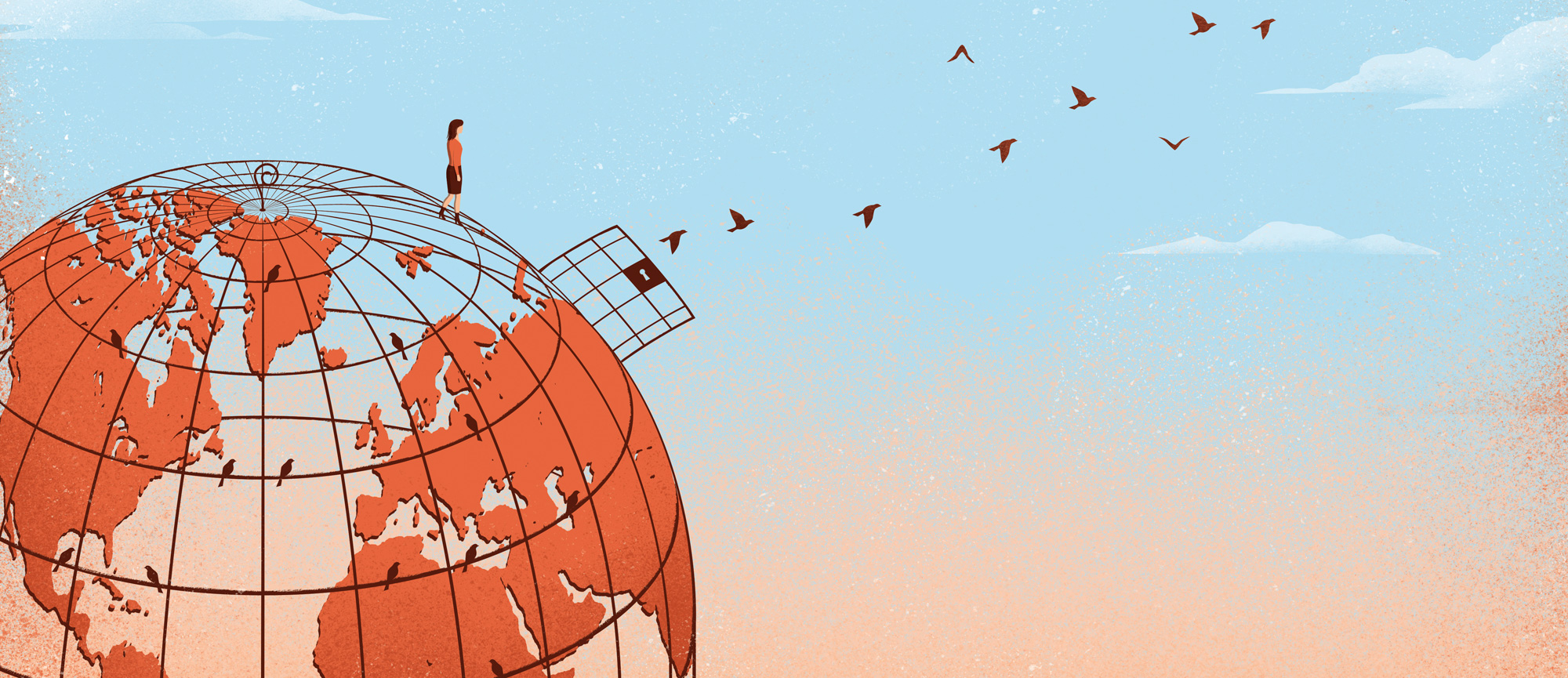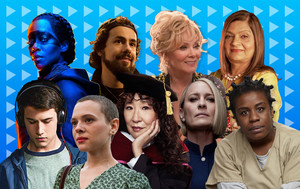
So many stories begin with borders.
I was brought up with no sense of a motherland or fatherland, no pledges of allegiance, no flags with which to identify. I am a citizen of Switzerland, where I was raised; Canada, where I was born; and Iran, where my parents of Russian and Armenian descent lived before leaving to study abroad. I speak fluent French and English, bad German, and passable Russian. I live in New York but don’t feel as if I belong to any particular country, state, or national community. I prefer to think of myself as a citizen of the world.
The first image most people have of a world citizen, or “cosmopolite,” is of a person of wealth, education, and privilege — a member of the global elite who travels in rarefied circles and spends too much time in frequent-flyer lounges. The term is used ad absurdum in other contexts, too; you’d never know by reading the Google results for “cosmopolitan” — which include links to a Las Vegas strip hotel and a raunchy women’s magazine — that the initial concept of cosmopolitanism was born long before air travel was even possible, some 2,500 years ago, in Greece.
Diogenes of Sinope was the West’s first conscientious objector, and perhaps the first to refuse to pledge allegiance to his homeland. In the wake of the Peloponnesian War, he opted out of society, and the lifestyle he chose — drinking and debating all day, urinating openly, sleeping in a wine barrel — won him the nickname of Kunos, the dog. His school of thinkers took up the label proudly, dubbing themselves Cynics, and when respectable people asked Diogenes what city was his home, he replied, “I am a kosmopolites” — a citizen of the universe.
A generation after Diogenes, a fiery young intellectual named Zeno of Citium burst onto the Athenian scene. The school he founded, known as Stoicism, agreed that the premise of the polis needed some serious rethinking; but where Diogenes had pissed on the very notion of the city-state, the Stoics declared that moral evolution required rising above national borders and joining a universal community. All men on earth, they contended, must strive to be kosmopolites, governed not by local custom but by the reason that unites all mankind and binds together the citizens of the universe.
It’s worth revisiting this concept today — not just because looming environmental crises such as rising sea levels will change the world map and affect us all, regardless of our nationality, but because it’s becoming less clear what it means to be a citizen of anywhere in the twenty-first century. At a moment when there are more refugees displaced from their homes than there have been since World War II, when Syrians will risk everything for a chance at a better future in Europe, and when droves of unaccompanied children from Central America arrive at the US border seeking sanctuary, why are people still categorized by where they’re born? As a result of the globalization of media, finance, education, and trade, ours is increasingly a world of men and women who, whether for economic, personal, or political reasons, want or need to live in places they were not assigned to by the accident of birth: the farm worker from Mexico who looks to California for seasonal employment; the Chinese entrepreneur who invests in foreign stocks and educates his kids in Canada; the Irishman kept apart from his Singaporean lover because of artificial borders set decades ago; the billionaire who treats citizenship as a commodity and buys passports and residence permits in order to travel more freely and pay lower taxes.
The reality is that however intertwined our collective fates might be, individual nations still have the last word in determining who can go where, when, how, and for how long — and the consequences are predictably bleak. The wealthy can move freely between countries and exploit the “borderless” world that advocates of globalization promise. The same goes for their money. But the poor who try to cross borders don’t always arrive at their destinations, and routinely die trying. The sinking ships move from east to west. The migrants move from south to north. Along these journeys, a wealth- and class-based hierarchy of nationalities emerges: German, good. Swedish, good. Canadian, good. Afghan, bad. This taxonomy has its own terms of art: if you are poor or black or on the brink of death, you’re a migrant; hardworking and from a third-world country, you’re an immigrant; rich and white, you’re an expat.
It’s pretty obvious that the “quality,” so to speak, of citizenships and visa restrictions falls largely along economic and ethnic lines. The very same countries that reject the poor arriving by sea tend to roll out the red carpet for wealthy investors. They have taken to selling what are known as “access rights” at their door. For those in the market for a second (or third) passport, and the rights and privileges that come with it, the range of options has never been more plentiful. It is possible to become, through completely legal and legitimate means, a citizen of St. Kitts and Nevis, Antigua and Barbuda, Grenada, Dominica, Malta, Bulgaria, Cyprus, and Austria. The documents can be bought for as little as one hundred thousand dollars (Dominica) or upwards of a million euros (Austria, Malta). Small, poor, or marginalized countries see selling their nationality to rich foreigners as a viable way to raise money; their endeavors are met with great outside interest.
The high-net-worth “global citizens” who buy passports from Caribbean tax havens without setting foot in their adopted countries, and the Syrian or Eritrean refugees for whom the promised land is pretty much any place but the one they’re running from, represent two sides of a common phenomenon. Their identities, movements, actions, and transactions challenge any meaningful connection between man and state; national citizenship, while by no means irrelevant on a practical level, is beginning to show its cracks as an institution.
 For what does citizenship become when it is a matter of convenience, not community? When it is detached from civic engagement, participatory democracy, wealth redistribution, and political identification? What are the stakes when members of a community no longer feel a particular kinship or loyalty to any particular place? How do we navigate this new world?
For what does citizenship become when it is a matter of convenience, not community? When it is detached from civic engagement, participatory democracy, wealth redistribution, and political identification? What are the stakes when members of a community no longer feel a particular kinship or loyalty to any particular place? How do we navigate this new world?
Some scholars, such as Joseph Carens, one of the leading ethical thinkers in the field of immigration, have suggested abolishing borders entirely; others, such as the late Samuel Huntington, a conservative political scientist, have argued in favor of encouraging nationalism and patriotism to counter the negative effects of globalization and help people feel more rooted in their communities and countries.
Others focus on the important role that educational institutions — universities like Columbia — can play in building the infrastructure for a global society. In her seminal essay “Patriotism and Cosmopolitanism,” American philosopher Martha Nussbaum poses a fundamental question about education and citizenship. “As students here [in the US] grow up,” she writes, should they be taught that “they are above all citizens of the United States, or should they instead be taught that they are above all citizens of a world of human beings, and that, while they themselves happen to be situated in the United States, they have to share this world of human beings with the citizens of other countries?” Columbia President Lee C. Bollinger believes that the university can play an essential role in laying the groundwork for a global world: “There always have been global issues, but the prevalence of them now, the centrality of them for basic life in any society, is much greater ... Climate change, issues of censorship, everything you look to now has a global character to it. That new world, and the changes that are being wrought by these forces, mean you have to step back and think about the fields and the subjects that you do research in, the classes that you teach, the knowledge that you want to impart to young people. I think everything needs to be reconsidered, rethought, and planned for this world,” he said in a recent interview.
The role of the university — to act ethically at home and abroad, and to teach these global ethics — has never been more important. Because if the concept of national citizenship is, in fact, losing relevance, oughtn’t we all aspire to be more global? Could we revisit the Stoics and take the idea of citizenship back to its utopian roots by acknowledging that we are all citizens of the world and share something fundamental that cannot be defined by wealth or status?
These questions might sound abstract, but they’re playing out before our eyes. When Scotland voted on whether to secede from the UK in 2014, the “yes” camp presented a softer, more inclusive, more progressive vision of what it means to be Scottish. The UK, on the other hand, requires many foreigners to make a minimum salary in order to live within its borders. European Union ministers are, as of this writing, debating a plan to apportion refugees from the Middle East, Afghanistan, and Africa. It will require some increasingly xenophobic countries to accept migrants against their will.
Over the next few decades, the issues will only become more complex as entire nations are likely submerged by rising tides. The need for binding international cooperation to curb climate change is critical, but on the ground, the question is existential. Where will Maldivians be “from” if they lose the ground beneath their feet? Will those displaced by the deluge end up bidding for a new nationality on the open market? Will they end up stateless? Where will they go?
These are the stakes of citizenship in the twenty-first century.
Adapted from The Cosmopolites: The Coming of the Global Citizen, published in November by Columbia Global Reports.



